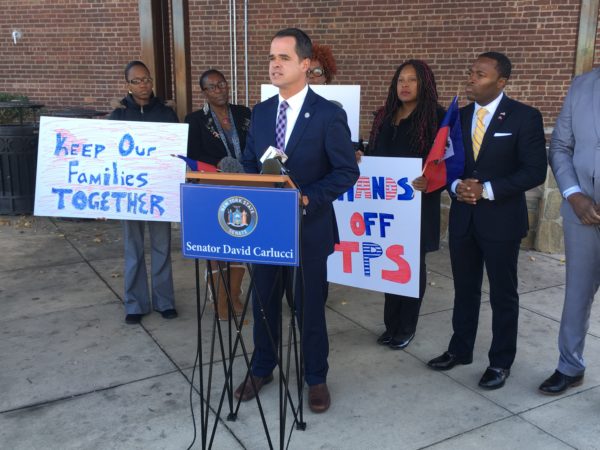Rockland Legislators Speak Up for Haiti in Wake of Trump Admin Ending Protection Status
Many Rockland County politicians, including State Senator David Carlucci, Assemblywoman Ellen Jaffee, and legislators Toney L. Earl, Nancy Low-Hogan and Aney Paul, are calling for federal officials to reconsider President Donald Trump’s decision to end a protection status that would force nearly 60,000 Haitians living in the U.S. to return home.
The Temporary Protection Status was granted to Haitian nationals following a massive earthquake that devastated the Caribbean nation in 2010, killing more than 200,000, spreading cholera and destroying infrastructure. The U.S. Department of Homeland Security said Monday that the Temporary Protection Status issued to Haitians as a result of the 2010 earthquake will expire by July 2019. For Haitians with TPS, it means leaving the U.S. on their own or facing deportation if they have not left by the deadline.

State Sen. David Carlucci at Haitian TPS Rally
Rockland County has long been home to a sizable Haitian community, and when the storm hit some refugees came to Rockland County to live, work and go to school. The county is currently home to more than 25,000 people.
To send thousands back into these circumstances is, quite frankly, cruel.
“I am calling on the President and Acting Secretary Elaine Duke to immediately reverse this decision,” Senator Carlucci said on Tuesday, standing with Haitian American community groups and Haitian American citizens at a rally. “Our friends and neighbors in Haiti have been suffering for many years due to Four tropical storms in 2008, a terribly devastating earthquake in 2010, and a hurricane in 2016. Additionally, a recent cholera outbreak, combined with political unrest and socioeconomic instability shows that Haitians need time to stabilize their country. To send thousands back into these circumstances is, quite frankly, cruel.”
In July, then-Homeland Security Secretary John F. Kelly allowed a six-month TPS extension for Haitians that expires in January. Acting Homeland Security Secretary Elaine Duke extended the deadline to July 2019 to give people additional time to make arrangements to leave.
Assemblywoman Jaffee expressed a similar sentiment as Carlucci. “I am extremely disappointed that the Trump Administration has decided to discontinue the Temporary Protected Status (TPS) designation that was granted to Haitian Nationals as protection after the 7. 0 magnitude earthquake in 2010 that affected one-third of Haiti’s population, displacing 1.5 million people, and causing catastrophic damage to the country’s infrastructure,” she said.
Haiti is the poorest nation in the Western Hemisphere and last October, again faced disaster after it was hit by Hurricane Matthew, a Category 4 storm that killed more than 500 people and left 1.4 million in need of humanitarian assistance, according to published reports.
Legislature Chairman Toney L. Earl cautioned that Haiti is “not yet able to welcome these refugees back.” He added: “We should support the ongoing rebuilding effort in Haiti before considering the removal of Temporary Protection Status.”
Cholera outbreaks have been a persistent problem, and since the 2010 earthquake, more than 800,000 Haitians have contracted the disease and nearly 10,000 have died. The initial outbreak was traced to U.N. peacekeepers assisting with earthquake recovery. Haitians who have settled in the U.S., both as immigrants and refugees under TPS, contribute significantly to their home nation’s economy. Haitians in the U.S. sent about $2.36 billion back to Haiti in 2016, the latest statistics from the World Bank show. That’s about 25 percent of the nation’s $8.023 billion national income, according to the World Bank.
“Many of the refugees who came to the United States in 2010 have become productive workers and students looking to better their lives through education,” Legislature Vice Chairwoman Low-Hogan said. “They are helping to support and rebuild their home nation during this difficult time, and it’s just too soon to end TPS at this time.
TPS is extended to people in the United States who come from nations crippled by natural disasters or armed conflict that prevents their citizens from returning or prevents their country from adequately receiving them. A group’s status is regularly reviewed and a decide is made whether to continue the protections.
“It doesn’t make sense to cut into the progress that is being made in Haiti by pushing to end TPS at this time,” Legislator Aney Paul said. “Haiti grapples with so many socio-economic issues and this is only going to compound the problems. It makes more sense in the long run to allow the improvements to continue, even if takes more time.”








